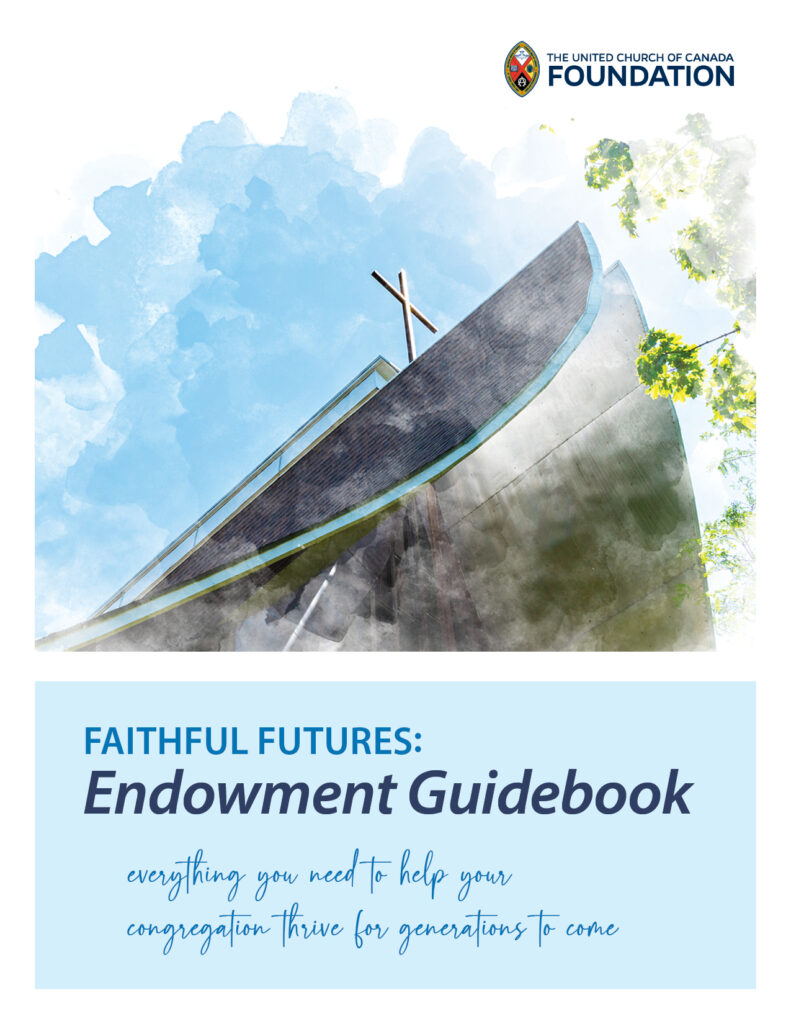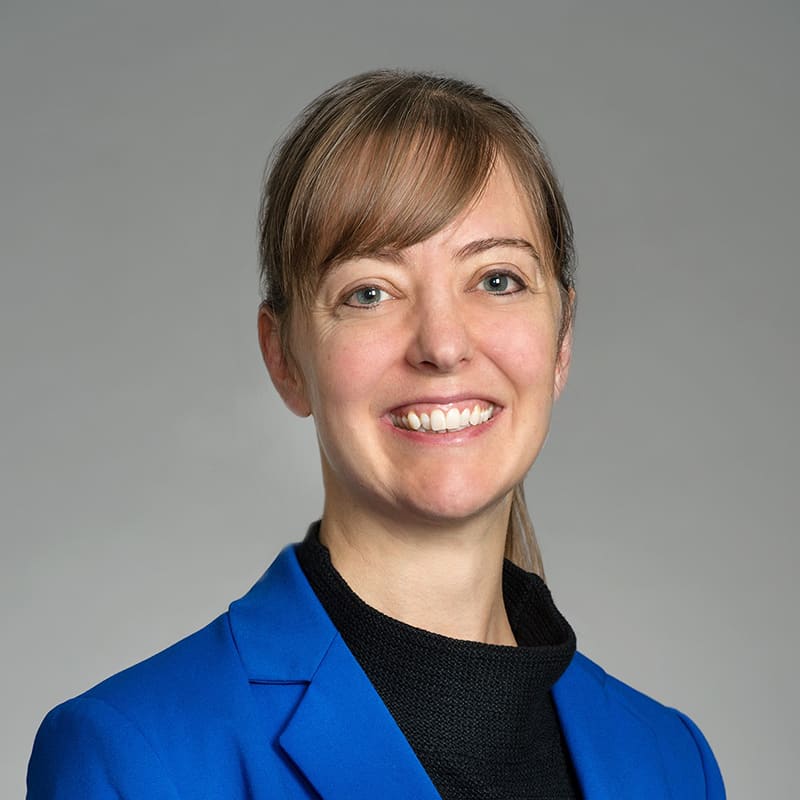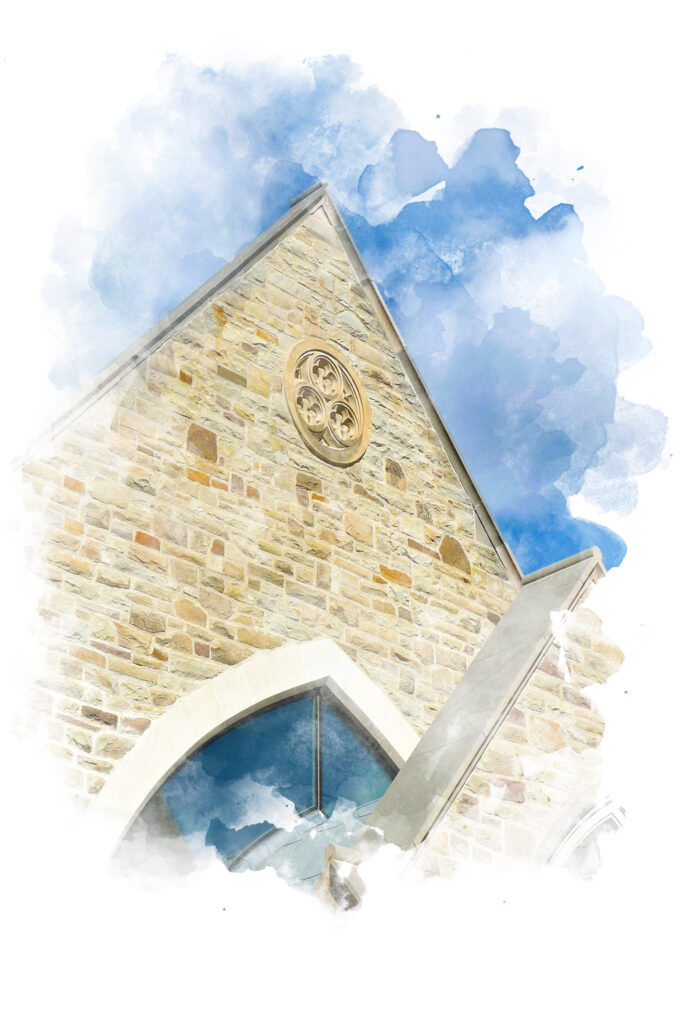
FAITHFUL FUTURES:
Endowment Guidebook
Everything you need to help your congregation thrive for generations to come.
United, we: can ensure that your church maintains a strong future
Your heartfelt desire is that your congregation remain a strong and vibrant presence for generations to come.
We want that for you, too!
At the United Church of Canada Foundation, we believe your church is a key witness to God’s inclusive love in the world. God called your church into being; allow us to help equip you for the journey to come.
As congregations from coast-to-coast-to- coast celebrate our Church’s centenary, many are challenging themselves to imagine what deep spirituality, bold discipleship, and daring justice that God calls them to in the century to come.
Quick Find:
Wondering how the endowment process works?
How to establish your church’s endowment fund
Already have an endowment fund?
Looking for ways to promote your endowment fund?
Ideas to accelerate the growth of your endowment
Launching your endowment with the United Church of Canada Foundation is as easy as 1, 2, 3.
Let this Guide be your Guide
Created specifically for United Church congregations that are asking tough questions as they discern God’s call, this Faithful Futures: Endowment Guidebook is an answer to prayer.
This Guide provides church leaders with everything you need to help your congregation thrive for the next 20, 50, or 100 years.
It identifies the critical questions you need to ask and the issues that need to be raised. This helpful Guide not only provides step-by-step instructions, it also enables you to grow your finances by leaps and bounds.
Finally, this Guide highlights some of the many free resources that are readily available; answers frequently asked questions; and includes a glossary of terms written in clear language.
This guide is designed to be interacted with over a long period of time. For optimal use, download and print out the PDF and follow along.


We exist to help you achieve your goals
Over 20 years ago, the United Church of Canada Foundation was created to manage the investments of the United Church, including endowments of congregations like yours. Today, we manage assets in excess of $100 million.
While the best time to set up an endowment fund was 20 years ago, the second best time is today! And for those endowment funds that were established years ago, now is the time to consider who will manage them long into the future.
Congregations like yours can benefit from stable, sustainable, long-term funding; funds that you can count on as an annual stream of income to support the life and work of your church.
We invite you to a place of deep spirituality, bold discipleship, and daring justice. This will ensure your congregation faithfully and vibrantly lives out God’s mission for many, many years to come.
To discuss your plans and prayers for the future of your congregation, please call the Foundation, toll-free, at 1 866-340-8223, or email us: fdn@united-church.ca

Sarah Charters, CFRE
President, The United of Canada Foundation
Endowment Readiness
Questions We Need to Ask Ourselves
This quick questionnaire serves as both a great starting point for analyzing your congregation’s endowment building readiness. The more you answer ‘yes’ the better, of course. Regardless of your assessment, this will guide you as to what steps need to be taken next.
Ask Yourself
Please Consider
As a church, do we have a viable plan to maintain our ministries and programs long into the future?
Most congregations spend a great deal of time planning and budgeting for the upcoming year but don’t necessarily consider what God is calling them to long term. Envisioning the future will inspire people to fund it as they seek to answer the call.
If our congregation received a large bequest, would we be able to manage it long term?
The bigger the bequest, the greater the responsibility to manage it long term. Does your church have the expertise to steward this gift in perpetuity? Would your congregation benefit from experts who can facilitate complex gifts, including gifts of publicly traded securities and real estate?
Would sources of sustainable and increasing income help our church share Christ’s message of hope, peace, joy, and love?
With more churches dealing with deficits year after year, the stability that a sizeable endowment fund affords can provide members with the assurance that their congregation will be able to continue supporting their ministry’s works, values, and missions today and for all the tomorrows that are to come.
Do you anticipate decreased levels of giving as long-time, committed church members face old age, disability, and death?
Generally speaking, church memberships are getting older and smaller. Determine what percentage of gifts comes from individuals 65+. What percentage of the annual budget comes from the top 3 to 5 members of your congregation (and how old are they)?
If a compelling long-term vision for our church was presented to the congregation, is it likely that our members would contribute to an endowment?
Most members readily support immediate church needs. If you anticipate some people will hesitate to support the church’s longer term needs, storytelling can be a helpful tool for them to see the bigger picture. See pages 8-9 for inspiring ideas about how to share your church’s story.
A Quick Overview
Expertly Stewarding your Endowment Fund
When the United Church of Canada Foundation manages your congregation’s endowment fund, you can minimize your responsibilities, and help maximize your return on investment!
Your Responsibilities
The Amount – Choose how much you will contribute to your endowment fund. This is the principal. (This amount can be small or large. It can even be a fundraising goal. Additional contributions are added to the principal).
The Purpose – Choose how to use the income from your fund. You can allocate these disbursements as you faithfully respond to your church’s changing needs and priorities.
Communications – Choose how you would like to promote and communicate to your congregational members and adherents about your Endowment Fund. (With our assistance, you can then focus on accelerating growth).
Our Responsibilities
Ownership – The United Church of Canada Foundation is the owner of the portfolio. (This is a requirement of the Canada Revenue Agency in order for us to provide charitable receipts for donor contributions).
Disbursements – Once your fund balance reaches $15,000, we will distribute a grant to you annually. This disbursement is determined in accordance with both Canada Revenue Agency regulations and the Foundation’s Disbursement Policy. It is calculated based on the average balance of the fund over the eight quarters prior to the previous year’s end. In 2024, the disbursement was 4.25%.
Investment Asset Mix – We are grateful for the partnership of several financial companies and organizations that help us transform your gifts into meaningful, sustainable support for the United Church of Canada and its individual communities of faith like yours by earning income year-over-year.
With our investment partners, we determine the guidelines for the asset mix of the investment portfolio. Benchmarks are established to effectively evaluate the portfolio. Our investment managers’ performances are evaluated by subject matter experts with the Foundation’s Board and committees.
We have developed a series of Socially Responsible Investment Policies that enable us to make investments into organizations that align with the values and mission of the United Church. We work with our partners to ensure that our investments are always at least 96% compliant with these policies.
Principal
Transfer management of your church’s investment funds and long-term trusts to The United Church of Canada Foundation. In setting up your congregation’s endowment fund, you choose the purpose and what the proceeds of your fund will benefit.
Your investment is pooled with hundreds of other faith communities that we carefully manage.
Accelerated Growth
Now is the time to really grow your fund! Encourage those in your congregation to support the church for generations to come by adding their gifts to your church’s fund. This is the way to ensure your congregation thrives for the next 20, 50 and 100 years.

Income
Transfer management of your church’s investment funds and long-term trusts to The United Church of Canada Foundation. In setting up your congregation’s endowment fund, you choose the purpose and what the proceeds of your fund will benefit.
Disbursements
We provide regular reports and grants based on the performance of your fund. The income earnings that are distributed to your church will enable you to further your ministries and help fulfill God’s desires for our world.
Any remaining earnings and additional contributions are factored into the principal and your endowment continues to grow.
Establishing Your Church's Endowment Fund
Start here if your church doesn't have an endowment fund
Click the headings below to expand each box, and learn more about each step towards establishing your endowment fund.
Whether it starts with one, two, three or more members, light a spark that ignites a passion in parishioners that may have been dormant for some time.
Establishing a vision of what your church can become far into the future is a great way to encourage people to hear and then respond to God’s call.
Consider establishing a ‘Dream Team’ of visionary leaders at your church who have demonstrated their commitment to mission and ministry. You may wish to reach out to those who have expertise in fiduciary law, finance, investments, or marketing.
NOTE: Be sure to involve your minister! The support and leadership of your minister is vital in helping people create a program and process, which will bless your church’s ongoing ministry. An important contribution your minister can make is how this proposed endowment fits into the congregation’s vision of what God is calling them to be and do in the years to come.
Invite the treasurer to provide general, high-level information about giving patterns in your congregation.
Attention should focus on what portion of the annual budget is funded by various 10-year age groups, particularly members over age 60. The over 60 group is likely to have your best endowment prospects.
Your Case statement should seek to answer the question: “Why should members make a gift now or pledge a gift in their Will to help establish or enhance our church’s endowment?”
Through discussions and informal meetings with church members, identify two or three mission priorities that would benefit from endowment support. Examples might include: enhanced youth ministry programs; an expanded music ministry; additional Christian education opportunities; local mission programs; building maintenance; or capital improvements.
In some cases, the endowment income could assure support for ongoing programs during occasions when ordinary income may fluctuate. As you consider and develop your case statement, the deliberations will hopefully stimulate excitement about the endowment and may result in financial commitments for those involved.
This policy document need only be a few pages, but it should clearly state its operating principles such as: the purpose of the endowment fund, how the endowment income will be used, how gifts received will be handled (with or without restriction), disposition of non-cash gifts, how are funds to be invested, how a responsible committee will be structured and elected and what officers might be necessary.
Consider:
- What restricted funds are already in place?
- Can any of those funds be converted into the new endowment fund?
- Do you want a general endowment or do you want several ministry area endowment funds?
NOTE: Be sure to take advantage of the free resources provided by the United Church of Canada Foundation. Click here to download free resources.
Have your Official Board or Church Council approve your endowment fund policy
Plan to introduce your Endowment Fund over the course of a year. This should be fun because you’re talking about the future of your church.
A calendar of events will educate, inspire, and invite people to make gifts to the endowment. Announcements, print materials, seminars, and celebrations should be scheduled at least twice annually.
Never miss an opportunity to share the good news as soon as a gift is received. Be sure to communicate the positive impact the endowment creates!
NOTE: A great way to launch your endowment is to consider if some existing memorials, designated, or loosely restricted funds can be folded into the new endowment fund.
Also consider other initial funding ideas such as leadership gifts, birthday gifts, or other gifts appropriate to the congregation.
Since leadership gifts are critical to the success of your endowment, formulate a plan to identify and approach individuals to consider bequests or lifetime gifts.
A leadership gift doesn’t have to be a big gift. In fact, it may not be a gift at all. Someone could make a multi-year pledge or a commit to including the church in their Will.
One strategy favoured by many churches is to hold ‘coffee and conversation’ gatherings after church service or in members’ homes. These informal chats provide people with the
opportunity to talk about the long-range mission of the church and the importance of laying the groundwork now for the church’s vital ministry in the future.
NOTE: Leadership commitments often come from those who were initially involved in formulating the case statement and policies. Former board chairs and trustees are ideal candidates for making a leadership gift.
Rejuvenating your church’s endowment fund
Start here if your church already has an endowment fund
Click the headings below to expand each box to read each piece of advice about how to grow your existing endowment fund.
Although many churches manage an Endowment Fund, few have a plan to promote it to their congregation, share its impact, and invite new gifts to grow the Fund. Does this describe your church? If so, let’s get you on track!
Several of the steps to create a new Endowment Fund (see pages 8-9) can be modified to help you rejuvenate an existing Fund.
Establishing a long-term vision for your ministry is essential, as is identifying leaders in the congregation who can champion the vision. If you’ve already done this, ensure that you’ve included your existing Endowment Fund in this vision. Take the time to understand your congregation’s giving patterns, review the Fund terms, and incorporate what you learn – along with your key ministry priorities – into a case for support for the Endowment Fund.
Review your investment policy statement (IPS) and related policies (e.g., planned giving policy). Ensure they continue to serve your community of faith and align with your goals and beliefs.
Note: You should look at your IPS every three to five years.
Where is your Endowment invested? Explore your options and assess whether your current investment aligns with your congregation’s values and ethos.
For many years, the Foundation has provided a strong option for congregations to invest their endowment, ensuring that gifts entrusted to us are invested in ways consistent with the values of the United Church. We have long offered our expertise in investing to congregations and other communities of faith to support their current ministry and vision for their future. Our solid track record of excellent returns and prudent management have meant that we can maintain meaningful grants and support even through challenging
economic times.
The Foundation stewards more than 500 long-term funds, many established by organizations and communities of faith. Click here to learn more about our established funds.
To rejuvenate your Endowment Fund, it helps to get back to the basics. First, be sure to share with your congregation what Funds exist!
Gather as many inspiring stories about the Fund as you can. Are there church members who have contributed to your endowment funds? Invite them to share their inspiring “giving stories.” Is there someone who can share how a grant from the Fund has impacted their journey or who can share what the Endowment Fund helps to make possible?
The wider congregation may be pleasantly surprised to learn that endowment gifts paid for emergency repairs or enabled costly renovations to proceed. Perhaps a program was developed, or a youth minister’s salary is currently paid out of a fund. Make a plan to share these stories with the community of faith regularly; increased awareness of the Fund is an essential foundation for inviting new gifts.

Promoting your endowment fund
Here are a few helpful ideas to get you going.
Feel free to dream up more!
God is calling…
What is God calling your church to in the 20 years… 50 years… and 100 years? Share copies of those questions with members of your congregation to fill out.
Find inspiration!
Surely, there are people in your congregation whose family members named your church in their Wills? Ask them to tell you about what inspired them to do so. Share this with your congregation to inspire people.
Talk it up!
Encourage every committee and group in the church to spend time discussing their vision for their ministry or program in the years to come. Have them listen for God’s call.
Make a challenge!
Challenge church leaders to make a gift. Having people simply say that they’ve included the church in their Will will encourage others to do the same. No one ever needs to know the size of the gift.
Provide information!
Have someone from trustees speak to the importance of the endowment gifts already established at the church. What did these gifts pay for? How is your church better as a result?
Include the minister!
As shepherds, ministers ‘tend their flock’ and often know peoples’ private passions for mission or ministries. Maybe your minister can plant a seed that will germinate in their hearts and one day flourish!
Create a Vision Board!
Once people start sharing their stories, post them on a bulletin board for the entire congregation to see!
Celebrate gifts as they come in!
Celebrate each time money from your endowment goes to benefit a program or ministry at your church. Just celebrate!!
Once you have an endowment fund, we can help accelerate its growth!
Why should members include your church in their will through an endowment that’s stewarded by The United Church of Canada Foundation?
After first providing for their family and loved ones, encourage members to consider including your church in their will and, in particular, the Endowment fund that is managed by us. Doing so is a powerful, meaningful way for your legacy to contribute to the ministries of the United Church of Canada that are closest to their hearts.
With the help of their lawyer, we will ensure they are able to provide a legacy of faith in action.
Over the course of one’s life, people invariably become passionate about a particular cause or ministry. If their favourite cause is your church, a bequest to the Foundation designating your community of faith as the beneficiary is the best way to ensure that it is supported into the future.
We have resources to help people prayerfully make a bequest
Congregational leaders love our step-by-step workbook, Launching a Planned Giving Program in your Congregation.
Our helpful Will Workbook is also available to help guide your church’s members in their estate planning.
Our Legacy Giving flyer is available for people and their lawyer or notary to review while drafting their will.
There are a great many advantages to people leaving a bequest
- Their gift helps ensure your church will remain vital for future generations.
- They have the satisfaction of knowing that their legacy gift will support transformational ministry.
- A gift to your congregation can enable opportunities for whatever the future may hold.
- Giving a percentage of their estate keeps their gift in line with their assets as they change in value.
- Their estate obtains a charitable tax receipt for the full amount received.
- A bequest produces a tax credit of up to 100 percent of someone’s estate’s taxable income on their final income tax return. This credit may be carried back to the previous year.
- If you leave property such as stocks or real estate that has appreciated in value, your gift may be exempt from capital gains.
- Consider leaving RRSPS, RRIFs, TFSAs and life insurance policies directly to your beneficiaries (e.g. your church’s endowment fund), instead of including them in your will as this may be more tax efficient.
Launching your endowment with us is as easy as one, two, three!
1. Let’s get started! Call us toll-free at 1 866 340-8223.
Let us help you to determine the most suitable endowment fund or long-term trust for your community of faith. There’s no commitment needed!
In order for you to make an informed decision, we will identify any restrictions, investment policies, gift acceptance policies, tax benefits, and CRA regulations that may arise.
We will direct you to our online resources or offer to mail or email you whatever you need in order to welcome others at your church into the conversation.
2. Present your findings to the trustees, official board or church council for their consideration.
Raising some of the questions that typically don’t get asked about the future of your church, begin a much-needed discussion about how to ensure your church remains vital in 20, 50 and another 100 years. (You’re not going to solve this in one meeting; it deserves prayerful consideration and this takes time).
Together, invite interested members of your congregation to determine the overall goals for your endowment.
Decide how best to steward your major investments for generations to come. Perhaps it’s time to invite the United Church of Canada Foundation to steward these critical assets rather than taking advantage of church volunteers.
3. Complete a fund agreement with The United Church of Canada Foundation.
We're here to answer your questions!
We have helpful resources that will educate and empower your church’s leadership to make the best decisions on behalf of future generations of members. Click the links below to discover other resources on our website.
We sing of a Church...
Read about how other communities of faith have empowered and secured the future of their most-beloved programs, ministries, and even their cherished buildings.
Our Foundational Priorities
In 2022, The United Church of Canada Foundation announced its four priorities, one of which was supporting communities of faith like yours.
Get in Touch
For personalized answers to your most-pressing questions, and to receive the resources that art most appropriate to you and your congregation, email us at fdn@united-church.ca or call us toll-free at 1 866 340-8223
Frequently Asked Questions
An endowment can be established with just an agreement between the Foundation and your congregation! You can include your intent to actively fundraise to grow your endowment in the agreement, as well as identify any Estate gifts that you may be aware of. To begin granting, your fund must reach a minimum of $15,000. You can set a higher threshold if you wish.
Leadership gifts come in any size and may include a one-time gift or a commitment to include the church in their Will. The amount of the gift is secondary to the willingness of church leaders to step forward with by making a tangible gift to ensure the church’s future.
This can vary depending on how the endowment is set up. Generally, an endowment will grant after one year.
Endowments are intended to be “forever funds”, providing support for your congregation in perpetuity. For this reason, the principal is restricted and only the income is disbursed as grants. If you’re looking to establish a fund with greater flexibility, we would be happy to discuss other long-term fund options.
Yes and no. Yes, detailed fund statements are released annually. And, no, nothing is hidden; all financial line items are included.
Every United Church organization should develop its own policy statement to ensure that it is managing its long-term funds efficiently, effectively, and with the core values of the organization and denomination in mind. An IPS doesn’t need to be very long to adequately convey the needs, requirements and desires of your organization. Sometimes one page is enough to describe how your congregation will manage its investment process. Consider:
- What are you trying to accomplish through investments?
- How diverse should your investments be?
- What percentage of each investment vehicle (stocks, bonds, equities) should be in your portfolio?
- How will you measure the performance of your portfolio?
- How will you evaluate the performance of your investment manager?
Most likely, yes. Endowment Fund(s) are established to ensure reliable funding is achieved through regular management of diverse asset allocation. If the market underperforms, the fund will yield positive returns but may be lower than anticipated depending on the size of the fund. We determine our granting annually with a multi-year rolling average for our rate of returns. This ensures that the market doesn’t substantially affect the disbursement amount in any given year.
The fund holder of the endowment dictates how the disbursed funds are to be used. If a church sets up an endowment, the disbursed funds are directed back to them as they see fit to further their ministries and activities.
The Foundation’s investment committee and board of directors oversee the fund managers and the
Foundation’s assets. The bulk of trusts and endowments of the Foundation (~94%) are invested with Fiera Capital in pooled funds. The remaining 6% are invested with Genus Capital, as impact investments (i.e. investments that have a positive social or environmental return in addition to a financial return). The Foundation has set a goal of reaching 50% impact investments. In both cases, with Fiera and with Genus, the Foundation’s assets are invested according to United Church values and, in the case of the investments with Genus, fully aligned with our priorities.
Yes, your Fund Agreement may be amended by mutual agreement between your congregation and the Foundation.
Annually, or upon request.
The Foundation may deduct reasonable administrative fees from the income generated by the Fund or from the capital if the income is insufficient. These fees may be modified from time to time by the Foundation in its sole discretion. The fee is assessed annually, and is based on the average market value of your Fund over each quarter. Our current fee structure is:
Average Fund Balance over the Past 8 Quarters – Fee
Up to $1 million – 1.50%
$1 million – $5 million – 1.25%
Over $5 million – 1.00%
Once your Fund has reached the granting threshold of $15,000, it will grant at a set rate, in accordance with Canada Revenue Agency regulations and as per the Foundation’s Disbursement Policy. Currently, this rate is 4.25% of the average balance of the Fund over the eight quarters prior to the previous year’s end. This will be distributed annually as grants as per the terms of your agreement.
Contributed capital is the total value of the cash that has been put into the principal of the investment. Market value reflects investment markets and is the current price or value of the invested principal if it were to be sold.
Generally, no. Many churches already have Endowment Funds and church givings aren’t normally negatively impacted by those who choose to contribute to these Funds.
That said, you’re always encouraged to speak with church members about the opportunity of giving a percentage of their contribution to the church’s Endowment Fund. By doing this, churches can ensure ongoing operational costs are still being covered while they invest in the future of the church. Additionally, donors can leave a bequest through the United Church of Canada Foundation to the church’s Endowment Fund. This creates a personal legacy to benefit your church forever. Donors will have the comfort knowing that our processes and control procedures are in place to safeguard the donation principal.
Glossary of Terms
Asset Mix
The breakdown of all assets within an investment portfolio.
Assets
Accumulated resources that provide future economic value such as investments, inventory, equipment, buildings, or land. Assets can be current, fixed, financial, or intangible.
Bequest
A transfer, by Will, of personal property such as cash, securities, or other tangible property.
Capital
The initial gift or transferred amount, any additional gifts, and any Capitalized Income of a Fund (i.e., income earned, or accumulated fund balances added to the principal of a Fund).
Case for Support
A persuasive document that outlines the reasons why potential supporters should invest in or donate to an organization. It typically includes information about the organization’s mission, impact, and specific programs or initiatives, as well as the needs it aims to address. It also articulates the benefits of contributing to the organization, and the potential impact of the support on those they serve.
Disbursement (also Grant)
The paying out or disbursing of money from a Fund. It also refers to the actual money distributed from a Fund, particularly as grants.
Endowment Fund
A Long-term Fund where the capital is held in perpetuity (forever) and from which a portion of the income generated by the investment is distributed as grants each year forever.
Fund Agreement
A document describing the name, purpose, funding and administration of an endowment fund, normally signed by the donor and the charity.
Income
Includes capital gains, dividends, and interest earned on invested Assets.
Investment Policy (also Investment Policy Statement)
A document that gives clear direction to your investment strategy. Inside, you will set clear objectives and criteria for investing which will inform your choices moving forward.
Investment Portfolio
A collection of investments owned by one organization or individual and managed with a specific investment goal in mind.
Leadership Gifts
Gifts to a campaign that will inspire giving by subsequent donors
Long-term Fund
An Endowment Fund is one type of Long-term Fund. Another type is a Trust, which is a Fund held 10 years or more that – unlike an endowment fund – will eventually be completely expended.
Planned Giving (also Legacy Giving)
The process of making a charitable gift to an organization or cause as part of an individual’s financial or estate planning. Usually involves considering the best way to make a substantial impact through donations, typically through methods such as bequests, gifts of life insurance, charitable gift annuities, and donations of real estate or other appreciated assets. Planned giving may also encompass gifts given during an individual’s lifetime (e.g., gifts of securities).



